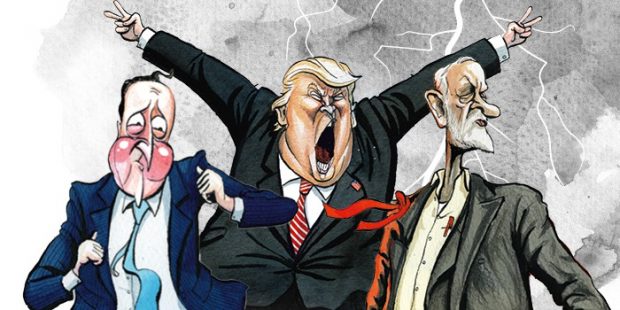Across the world, outsiders are challenging the political status quo: Ukip in Britain, Marine Le Pen’s Front National in France, Donald Trump in America. So does this mean that voters are finally dumping the established parties which for decades have simply swapped power between themselves?
On 13 July 2016, The Spectator held a discussion at the IET in London on the future of party politics. On the panel were The Spectator’s political editor James Forsyth, journalist and author Sir Simon Jenkins, Ipsos MORI CEO Ben Page and Professor Colleen Graffy, who was US deputy assistant secretary of state in the George W. Bush administration. The question they addressed was: Is party politics broken?
Andrew Neil said: ‘Everywhere you look, the parties that most of you have grown up with, the parties that created the post-war settlement, have either lost, or are on the defensive, or are already in the retreat. Is that simply a result of British exceptionalism… or is it the start of a pan-European uprising?’
James Forsyth said party politics IS broken, as plainly illustrated by the momentous recent changes in Britain. The establishment parties did not – could not – deliver a successful result for Remain and the real victor in the EU referendum was Ukip. Following the vote for Brexit, the resignation of David Cameron had triggered Machiavellian drama among the Conservatives, while the Labour party had simply imploded. Jeremy Corbyn had refused to leave following a vote of no confidence by MPs., and there were deep divides in the party: between ‘London Labour’ and ‘Northern Labour’, between establishment Labour and its traditional electorate.
James said: ‘One of the things that this referendum showed is that there is not a single mainstream politician in England that could speak to the working class. That is what lost this referendum essentially… There were days when David Cameron and George Osborne withdrew from the fray in an attempt to let Labour speak to their traditional working-class base. Nobody in the Labour party could do it. And I think that is incredibly telling about the brittleness of the system.’
But Sir Simon Jenkins said the party political system — an ‘ingenious’ creation of 18th century democracy — was strongly rooted in British history. It was not party politics itself that was broken, he argued, but the current mainstream parties. He said: ‘In this country we have a robust two-party political system; sometimes it needs reform’.
Ben Page took the view that while party politics was fine, society was fracturing and people’s loyalties were changing; support for mainstream parties decreased with each generation, he pointed out. At the same time, disillusionment and mistrust of the establishment was rising. He speculated that as times changed, parties might print fewer leaflets, knock on fewer doors and carry out more of their campaigning online.
Across the Atlantic, non-establishment candidates for the presidency had exceeded expectations. But Professor Graffy argued that party politics was still very much alive and well. One example of this was Michael Bloomberg’s decision not to run for presidency as an independent candidate. Despite his money, wealth, and demonstrable electability, the former Mayor of New York believed his chances to be slim without the support of a party apparatus.
As the event was taking place, new Prime Minister Theresa May had started her cabinet reshuffle, and this was seen as evidence that the Conservative party was bouncing back confident and united after the turmoil of the previous three weeks.
At the end of the discussion, a show of hands among the 450-strong audience showed a clear majority for the view that party politics is NOT broken. Make your own mind up on who won the debate by watching our video of the debate above.
Thank you to Rathbones for sponsoring this event.







Comments